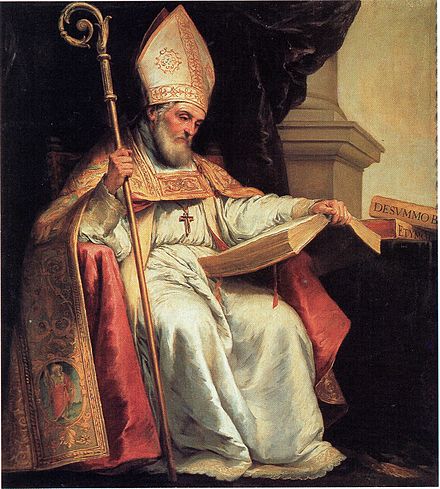
St. Isidore of Seville Redux: Do Faith-Based Charter Schools Have a Future?
Charles J. Russo
St. Isidore of Seville (1655) depicted by Bartolomé Esteban Murillo (CC0).
Introduction
As I discussed previously, a controversy arose on June 5, 2023, when Oklahoma’s Statewide Virtual Charter School Board authorized the creation of St. Isidore of Seville Catholic Virtual School. Named after the patron saint of the internet, and intended to operate under the leadership of the Roman Catholic Archdiocese of Oklahoma City and the Diocese of Tulsa, St. Isidore was scheduled to open in the Fall of 2024 as the Nation’s first fully publicly funded faith-based charter school serving up to 500 K-12 students from across the state.
Due to issues surrounding St. Isidore’s operation, however, the proposed creation engendered a significant controversy gaining national attention. The St. Isidore case raised an array of state law questions and the potential expansion of the Child Benefit Test under the Federal Establishment Clause. Rather than rehash the issues I examined in my earlier essay on the Oklahoma case, this article picks up where the last one left off with a brief review of the judgment of the Supreme Court of Oklahoma preventing the school from opening. Although this litigation is, of course, limited to Oklahoma, this piece reflects on the potential impact of the Oklahoma Supreme Court’s decision on charter schools, the parental choice movement, and the Child Benefit Test that emerged in 1947 in Everson v. Board of Education. In Everson the Justices upheld the constitutionality of a New Jersey statute permitting local boards to make rules and enter contracts to transport children to and from their faith-based, largely Roman Catholic, schools. Awareness of the dispute involving St. Isidore is particularly timely now that the Statewide Virtual Charter School Board, joined by Alliance Defending Freedom, a public interest law firm specializing in religious liberty, announced they would appeal to the United States Supreme Court.
Judicial History
Not long after Oklahoma’s Statewide Virtual Charter School Board authorized the creation of St. Isidore, opponents including the State Attorney General and American Civil Liberties Union filed suit challenging its action.
Majority Opinion
On June 25, 2024, in Drummond v. Oklahoma Statewide Virtual Charter School Board, the Supreme Court of Oklahoma, in an opinion by Justice James R. Richardson, relying largely on state law, invalidated plans to open St. Isidore. Chief Justice John Kane recused himself. Vice Chief Justice James Rowe issued a two-sentence order in which he “concur[ed] with the Majority that Article 1, Section 5 of the Oklahoma Constitution mandates that public charter schools are nonsectarian” [but] dissent[ed] to the remainder of the Majority’s opinion.” Justice Dana Kuehn dissented.
In asserting original jurisdiction, the court recognized that “the State seeks a writ of mandamus directing the Charter School Board to rescind the St. Isidore Contract. The question before this Court is whether the St. Isidore Contract violates state and federal law and is unconstitutional.” The court succinctly ruled that “the St. Isidore Contract violates the Oklahoma Constitution, the Act, and the federal Establishment Clause.”
The court divided its relatively brief order into four sections. In its opening two-part section the court explained that because Article 2, Section 5 of Oklahoma’s constitution prohibits the use of public money to benefit or support religious institutions, “[e]nforcing the St. Isidore Contract would create a slippery slope and what the framers’ warned against–the destruction of Oklahomans’ freedom to practice religion without fear of governmental intervention.” The court then determined that allowing St. Isidore to operate would have violated Article 13, section one of the state constitution’s mandate to operate “public schools, which shall be open to all the children of the state and free from sectarian control[.]”
The court next rejected St. Isidore’s claim that it was a private corporation rather than a public school, indicating that, as a state entity under Oklahoma and federal law, its sectarian nature rendered its existence unconstitutional. In part three, the court found that as a governmental entity and state actor, St. Isidore’s operation as a Catholic school would have violated the Establishment Clause.
At the heart of the final part of its rationale, the panel summarily distinguished the situation in St. Isidore from the Supreme Court’s recent trilogy of Trinity Lutheran Church of Columbia v. Comer, Espinoza v. Montana Department of Revenue, and Carson v. Makin. In these cases the Court expanded the boundaries of permissible state aid to faith-based schools and their students.
The Court remarked there was no compelling state governmental interest justifying the creation of St. Isidore as a private religious charter school entitling it to receive generally available public financial benefits.
The court concluded that as a charter school under state law which must be nonsectarian, “[t]he St. Isidore Contract violates state and federal law and is unconstitutional.” The court thus issued a writ of mandamus directing the Charter School Board to rescind its contract with St. Isidore.
Dissent
Justice Kuehn’s two-part dissent began by noting that allowing faith-based organizations to contract with the State to provide educational services violated neither the Oklahoma Constitution’s “no aid” provision nor the Establishment Clause. Kuehn reasoned that “[e]xcluding private entities from contracting for functions, based solely on religious affiliation, would violate the Free Exercise Clause . . . ” She added that the Constitution “does not bar the State from contracting for education services with sectarian organizations, so long as a state-funded, secular education remains available statewide. St. Isidore would not be replacing any secular school, only adding to the options available . . . requiring the state to fund non-sectarian education is not the same as allowing some funds to flow to sectarian education programs.”
In the second section of her dissent Kuehn maintained that denying aid to St. Isidore violated the Free Exercise Clause. Briefly citing Trinity Lutheran, Espinoza, and Carson, she concluded that “nothing in the State or Federal Constitutions barring sectarian organizations, such as St. Isidore, from applying to operate charter schools [and that by] reaching the opposite conclusion, the Majority’s decision is destined for the same fate as the Montana Supreme Court’s opinion in Espinoza.”
Reflections
In light of the Statewide Virtual Charter School Board and Alliance Defending Freedom’s having announced plans to appeal Drummond, the question Justice Yvonne Kaugerasked during oral arguments, “[a]re we being used as a test case?,” has proven to be prescient. Although the attorney for the state board answered in the negative, she responded, “[i]t sure looks like it.”
Importantly the Drummond court relied primarily on state law while largely glossing over the recent trilogy of Supreme Court cases expanding the parameters of generally available aid to faith-based schools and their students. Further, the court did not adequately respond to the dissent’s analysis of those cases. The majority, therefore, invariably leaves itself open to being second guessed on appeal.
The St. Isidore cases raises challenging constitutional and educational questions about the rights of parents to direct the schooling of their children in light of the Supreme Court’s statement in its monumental 1925 ruling in Pierce v. Society of Sisters of the Holy Names of Jesus and Mary, which upheld the rights of non-public schools to operate based on the Fourteenth Amendment Due Process Clause. In Pierce the Court famously declared that “[t]he child is not the mere creature of the state; those who nurture him and direct his destiny have the right, coupled with the high duty, to recognize and prepare him for additional obligations.” Under this principle, while parents have the right to choose where their children will be educated, a related thorny question under the Child Benefit Test asks: who should pay for the schooling and to what extent can public funds be used.
Under Trinity Lutheran, Espinoza, and Carson, which extended the reach of the Child Benefit Test, the aid for the schools in question was still primarily directed to or for the benefits of children rather than to the institutions. For Trinity Lutheran in Missouri and Carson in Maine, benefits were directed so children could attend pre-existing schools. In Espinoza, benefits were directed so parents could participate in an ongoing program of generally available tax benefits. To the extent that the Oklahoma provisions place greater restrictions on parental rights by limiting the recipients of generally available aid (as in Espinoza), a plausible argument can be made that has already nullified the state constitutional arguments that the Oklahoma Court relies on.
Even as an avowed accommodationist who favors aid to faith-based schools, their students, and parents, though, plans to open St. Isidore seem to be something of a bridge too far because doing so would enable the creation of an entire institution devoted to the teachings of the Catholic faith.
While St. Isidore’s admissions policy did not preclude enrolling students who are not of the Catholic faith, and all children would learn secular subjects such as reading, mathematics, and history, at its heart, questions arise because it was devoted to promulgating its own religious beliefs.
The day after the Supreme Court upheld the rights of parents to send their children to a faith-based school in Carson on account of a law preventing them from doing so both infringed on their rights to free exercise and was not neutral toward religion, the Justices created a seismic shift in their Establishment Clause jurisprudence in another case from Washington.
In Kennedy v. Bremerton School District, the Justices reasoned that a school board violated a football coach’s First Amendment Free Exercise and Free Speech rights in not renewing his employment contract after he prayed silently on the field after games, despite a directive to the contrary. The Court emphasized that “a proper understanding of the Establishment Clause [does not] “require the government to single out private religious speech for special disfavor.” In creating this new standard, the Court added that “the Establishment Clause must be interpreted by ‘reference to historical practices and understandings.’”
Having effectively invalidated what had become an increasingly unworkable Lemon test, time will tell how this new standard plays out in future litigation, including for St. Isidore. A difficulty arises because in the Oklahoma dispute, however, as the state board approved the creation of an entire school, albeit online, even though the United States does not have a historical practice of providing greater public funding for faith-based schools (though such aid is present in nations such as, for example, Australia).
In evaluating the status of St. questions arise as to what limits can or should be placed on aid to faith-based schools and how much control public officials may be able to exercise over such matters as their curricula and hiring practices. Additionally, it remains to be seen to what extent, if any, officials operating publicly funded faith-based charters would be willing to cede some control over such essential matters as curricula and hiring in their schools. While it seems like a bit of a stretch for the Supreme Court to uphold the creation of St. Isidore, stay tuned because things may get interesting.
Postscript
On August 5 the Supreme Court of Oklahoma, by a 7-1 vote, rejected St. Isidore’s request for a stay of its order. Earlier, the Virtual Charter School Board which has since become part of the Statewide Charter School Board, delayed rescinding the contract with St. Isidore pending the outcome of this final appeal. ♦

Charles J. Russo M.Div., J.D., Ed.D., Joseph Panzer Chair of Education in the School of Education and Health Sciences (SEHS), Director of SEHS’s Ph.D. Program in Educational Leadership, and Research Professor of Law in the School of Law at the University of Dayton, OH, is also an Adjunct Professor at Notre Dame University of Australia School of Law, Sydney Campus.
Recommended Citation
Russo, Charles J. “St. Isidore of Seville Redux: Do Faith-Based Charter Schools Have a Future?” Canopy Forum, September 6, 2024. https://canopyforum.org/2024/09/06/st-isidore-of-seville-redux-do-faith-based-charter-schools-have-a-future/.
Recent Posts










